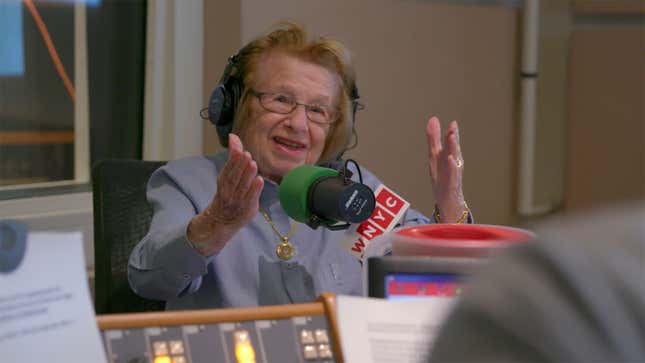Ask Dr. Ruth and Ye Shall Receive a Charming Portrait of the Sex Educator
Entertainment
Screenshot: Hulu
Because so much of what she espoused in the ’80s and ’90s became the truth as we know it, it’s easy to take Ruth Westheimer’s radicalism for granted. At a time when homosexuality was vilified (with its detractors using the AIDS crisis as proof), she encouraged acceptance. She was long one of the few mainstream voices explicitly advocating for women’s pleasure. When sex had barely dented the national dialogue, she was hosting a syndicated radio show that became a sensation and served to ensure that what consenting adults do in the privacy of their bedrooms was completely okay.
Ask Dr. Ruth, which is now streaming on Hulu, serves as a good reminder of Dr. Ruth’s impact. Directed by Ryan White (The Keepers, The Case Against 8), the bio-doc zips through not only Dr. Ruth’s career but her early childhood, during which she fled Nazi Germany and was ultimately orphaned when her parents were killed in the Holocaust. Throughout, Dr. Ruth is game to share her life, but only on her terms (“The director got only what I wanted him to have,” she recently told Rolling Stone). Ryan White told Jezebel, though, that Dr. Ruth was a breeze to work with. An edited and condensed transcript of our recent interview with the director is below.
JEZEBEL: Why did you want to profile Dr. Ruth?
RYAN WHITE: I was born in 1981, and that’s the year that she blew up with Sexually Speaking on New York radio. I grew up in the ’80s and ’90s with Dr. Ruth all over the airwaves, but I was a child or young adolescent during her heyday. I always kind of saw her as the funny old grandma on television saying things I shouldn’t be listening to. And then Dr. Ruth’s television career for the most part ended in the mid-’90s, when talk shows became more sensational. She wouldn’t go in that direction, so she decided to go off the air.
After the mid-’90s, I think I didn’t really know what Dr. Ruth was doing. I got a phone call a couple of years ago from a producer, Rafael Marmor, and he said he was walking Dr. Ruth and she refused making a documentary for many decades, but that he felt she might be interested and would I like to have dinner with her. Of course, I jumped at the opportunity. I think anybody would. At dinner, I totally fell in love with her.
-

-

-

-

-

-

-

-

-

-

-

-

-

-

-

-

-

-

-

-

-

-

-

-

-

-

-

-

-

-

-

-

-

-

-

-

-

-

-

-








































